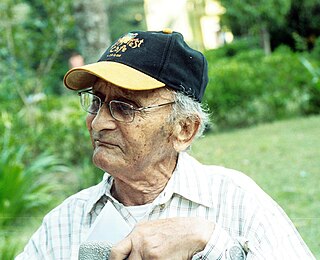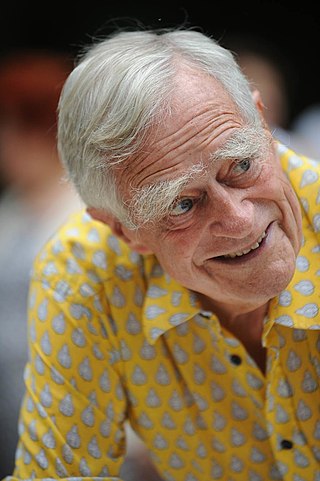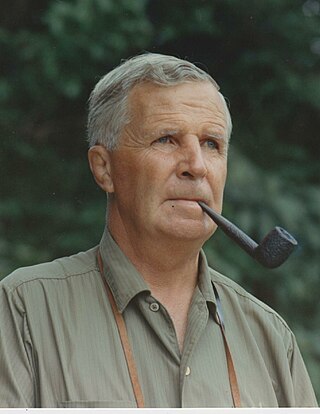Related Research Articles

An ecoregion is an ecologically and geographically defined area that is smaller than a bioregion, which in turn is smaller than a biogeographic realm. Ecoregions cover relatively large areas of land or water, and contain characteristic, geographically distinct assemblages of natural communities and species. The biodiversity of flora, fauna and ecosystems that characterise an ecoregion tends to be distinct from that of other ecoregions. In theory, biodiversity or conservation ecoregions are relatively large areas of land or water where the probability of encountering different species and communities at any given point remains relatively constant, within an acceptable range of variation . Ecoregions are also known as "ecozones", although that term may also refer to biogeographic realms.
The conservation movement, also known as nature conservation, is a political, environmental, and social movement that seeks to manage and protect natural resources, including animal, fungus, and plant species as well as their habitat for the future. Conservationists are concerned with leaving the environment in a better state than the condition they found it in. Evidence-based conservation seeks to use high quality scientific evidence to make conservation efforts more effective.

Sir Peter Markham Scott, was a British ornithologist, conservationist, painter, naval officer, broadcaster and sportsman. The only child of Antarctic explorer Robert Falcon Scott, he took an interest in observing and shooting wildfowl at a young age and later took to their breeding.

The International Union for Conservation of Nature (IUCN) is an international organization working in the field of nature conservation and sustainable use of natural resources. Founded in 1948, IUCN has become the global authority on the status of the natural world and the measures needed to safeguard it. It is involved in data gathering and analysis, research, field projects, advocacy, and education. IUCN's mission is to "influence, encourage and assist societies throughout the world to conserve nature and to ensure that any use of natural resources is equitable and ecologically sustainable".

Jared Mason Diamond is an American scientist, historian, and author best known for his popular science and history books and articles. Originally trained in biochemistry and physiology, Diamond is commonly referred to as a polymath, stemming from his knowledge in many fields including anthropology, ecology, geography, and evolutionary biology. He is a professor of geography at UCLA.

Sir Julian Sorell Huxley was a British evolutionary biologist, eugenicist, and internationalist. He was a proponent of natural selection, and a leading figure in the mid-twentieth century modern synthesis. He was secretary of the Zoological Society of London (1935–1942), the first Director of UNESCO, a founding member of the World Wildlife Fund, the president of the British Eugenics Society (1959–1962), and the first president of the British Humanist Association.
Edward Max Nicholson was a pioneering environmentalist, ornithologist and internationalist, and a founder of the World Wildlife Fund.

Habitat conservation is a management practice that seeks to conserve, protect and restore habitats and prevent species extinction, fragmentation or reduction in range. It is a priority of many groups that cannot be easily characterized in terms of any one ideology.

The Zoological Society of London (ZSL) is a charity devoted to the worldwide conservation of animals and their habitats. It was founded in 1826. Since 1828, it has maintained London Zoo, and since 1931 Whipsnade Zoo.
Guy Mountfort was an English advertising executive, amateur ornithologist and conservationist. He is known for writing the pioneering A Field Guide to the Birds of Britain and Europe, published in 1954.

James Maxwell McConnell Fisher was a British author, editor, broadcaster, naturalist and ornithologist. He was also a leading authority on Gilbert White and made over 1,000 radio and television broadcasts on natural history subjects.

Wildlife conservation refers to the practice of protecting wild species and their habitats in order to maintain healthy wildlife species or populations and to restore, protect or enhance natural ecosystems. Major threats to wildlife include habitat destruction, degradation, fragmentation, overexploitation, poaching, pollution, climate change, and the illegal wildlife trade. The IUCN estimates that 42,100 species of the ones assessed are at risk for extinction. Expanding to all existing species, a 2019 UN report on biodiversity put this estimate even higher at a million species. It is also being acknowledged that an increasing number of ecosystems on Earth containing endangered species are disappearing. To address these issues, there have been both national and international governmental efforts to preserve Earth's wildlife. Prominent conservation agreements include the 1973 Convention on International Trade in Endangered Species of Wild Fauna and Flora (CITES) and the 1992 Convention on Biological Diversity (CBD). There are also numerous nongovernmental organizations (NGO's) dedicated to conservation such as the Nature Conservancy, World Wildlife Fund, the Wild Animal Health Fund and Conservation International.

Russell Errol Train was the second administrator of the Environmental Protection Agency (EPA), from September 1973 to January 1977 and the founder chairman emeritus of World Wildlife Fund (WWF). As the second head of the EPA under Presidents Richard Nixon and Gerald Ford, Train helped place the issue of the environment on the presidential and national agenda in the late 1960s and early 1970s, a key period in the environmental movement. He was a conservative who reached out to the business community and Republicans. He promulgated the idea that as the economy of the nation was growing quickly, public as well as private projects should consider and evaluate the environmental impacts of their actions.
ARKive was a global initiative with the mission of "promoting the conservation of the world's threatened species, through the power of wildlife imagery", which it did by locating and gathering films, photographs and audio recordings of the world's species into a centralised digital archive. Its priority was the completion of audio-visual profiles for the c. 17,000 species on the IUCN Red List of Threatened Species.

Kunwar "Billy" Arjan Singh was an Indian hunter turned conservationist and author. He was the first who tried to reintroduce tigers and leopards from captivity into the wild.

The World Wide Fund for Nature (WWF) is a Swiss-based international non-governmental organization founded in 1961 that works in the field of wilderness preservation and the reduction of human impact on the environment. It was formerly named the World Wildlife Fund, which remains its official name in Canada and the United States. WWF is the world's largest conservation organization, with over five million supporters worldwide, working in more than 100 countries and supporting around 3,000 conservation and environmental projects. They have invested over $1 billion in more than 12,000 conservation initiatives since 1995. WWF is a foundation with 65% of funding from individuals and bequests, 17% from government sources and 8% from corporations in 2020.

Hans Lukas "Luc" Hoffmann was a Swiss ornithologist, conservationist, and philanthropist. He co-founded the World Wildlife Fund (WWF), helped establish the Ramsar Convention for the protection of wetlands, and set up the Tour du Valat research centre in the Camargue area of France. In 2012, Luc Hoffmann's MAVA Foundation, along with WWF International, established the Luc Hoffmann Institute. He was the author of more than 60 books, mostly ornithological.
Nigel Degge Wilmot Sitwell was an English conservationist, writer, editor and businessman specialising in wildlife and travel. He is noted for his travels in nearly 100 countries, including Antarctica, Tibet, East Africa and East Asia. In addition he edited and published the WWF magazine series Wildlife for 17 years.
Hemendra Singh Panwar is an Indian conservationist and civil servant, known for his efforts in the fields of wildlife and conservation. He was the first director of the Wildlife Institute of India and was the director of Project Tiger. The Government of India honoured him, in 2013, with Padma Bhushan, the third-highest civilian award, for his services to the environment and conservation.

John Simpson Owen was a Ugandan-born British conservationist who served as Director of the Tanzania National Parks from 1960 to 1972, during which time he was responsible for the establishment and management a network of National Parks, the Promotion of Scientific Research as a basis for conservation and wildlife tourism in the Serengeti National Park. He was awarded the World Wildlife Fund Gold Medal in 1973 for this and its contribution to the economy of a developing country. He was also the recipient of the Order of the Golden Arc from Prince Bernhard of the Netherlands.
References
- 1 2 Sir Arthur Norman (1981) The story of the World Wildlife Fund. Contemporary Review vol 239, 23-29.
- 1 2 3 4 5 6 7 8 Kate Kellaway (7 November 2010). How the Observer brought the WWF into being The Observer.
- ↑ WWF in the 60's WWF online history
- 1 2 Max Nicholson (1981). The first world conservation lecture. The Environmentalist Volume 1, Number 2, 109-116, doi : 10.1007/BF02232196
- 1 2 Scott, P. (1965). The launching of a new ark: first report of the President and Trustees of the World Wildlife Fund: an international foundation for saving the world's wildlife and wild places; 1961-1964. Collins
- ↑ Nicholls, H. The Way of the Panda: The Curious History of China's Political Animal (Profile Books, 2010), p. 65-67
- 1 2 Colin Willock (1991). Wildfight: a history of conservation. Jonathan Cape. p. 42.
- ↑ BRITISH COMMITTEE FOR REFUGEES FROM CZECHOSLOVAKIA AND CZECH REFUGEE TRUST FUND DOCUMENTS AT THE PUBLIC RECORD OFFICE